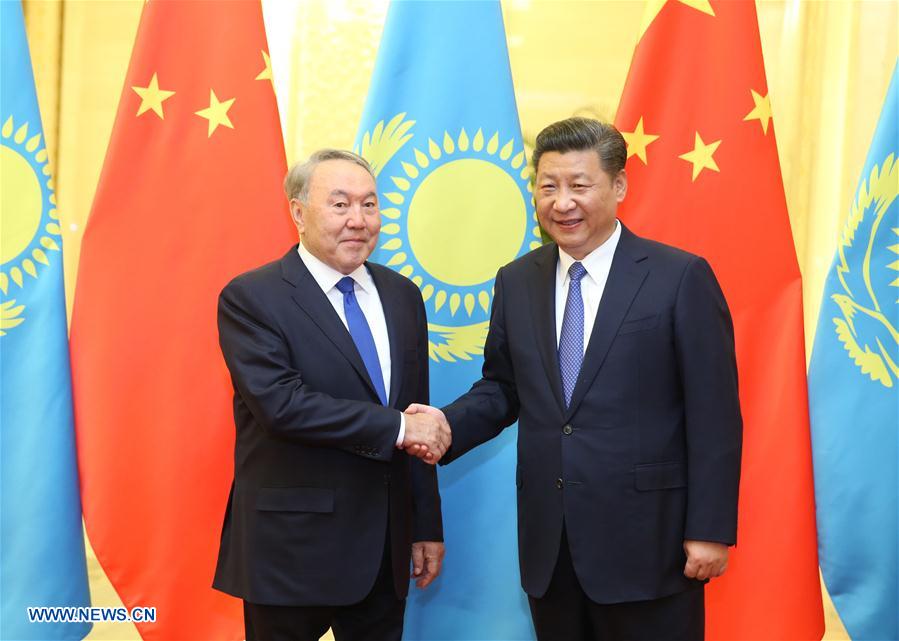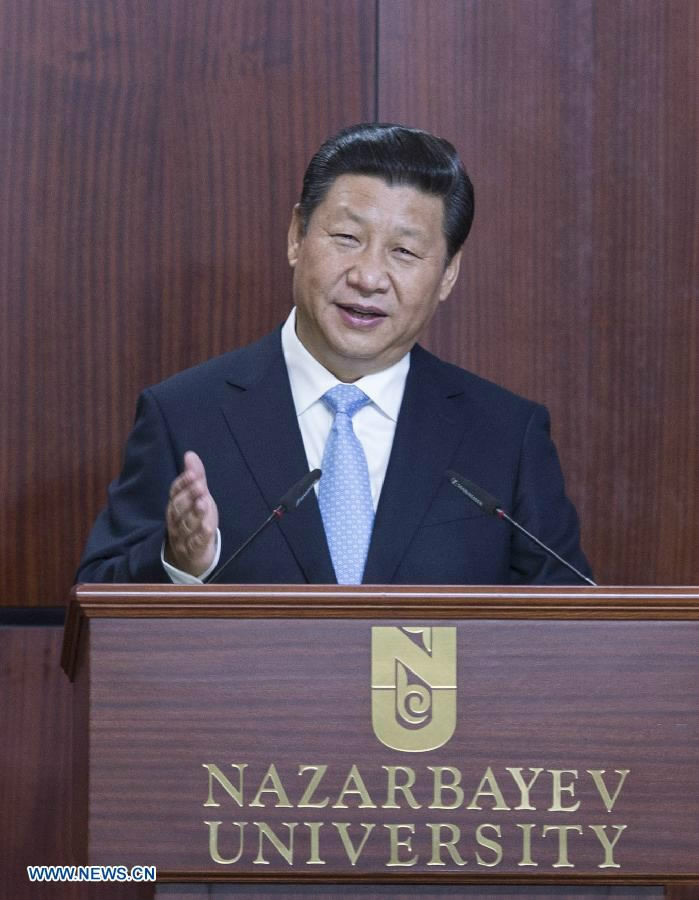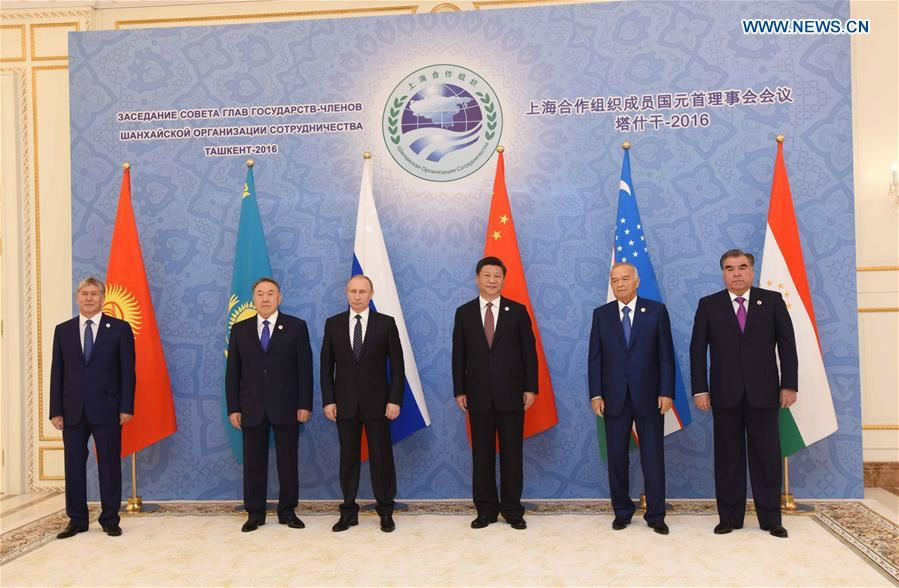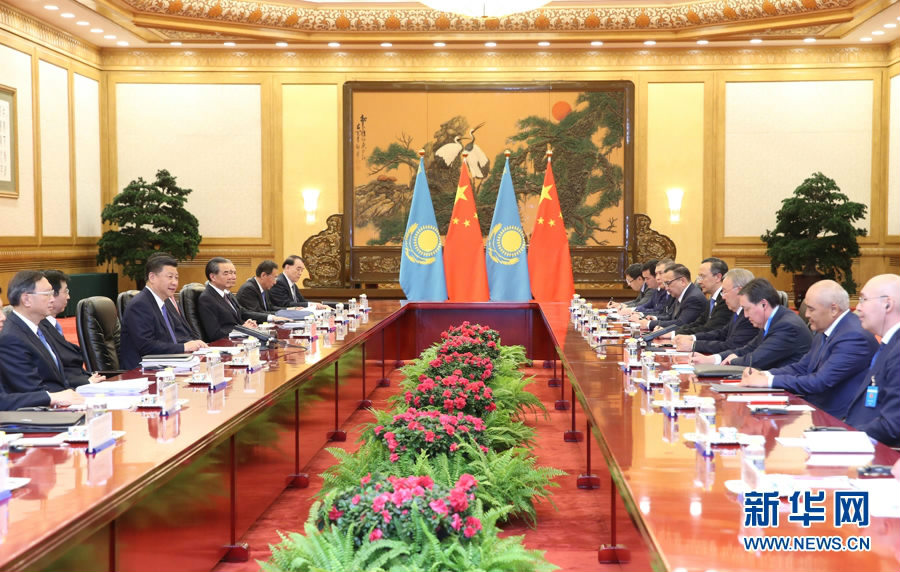


President Xi Jinping meets with his Kazakh counterpart Nursultan Nazarbayev during the Belt and Road Forum in 2017 (photo/Xinhua)
At the invitation of Kazakh President Nursultan Nazarbayev, Chinese President Xi Jinping will pay a state visit to Kazakhstan from June 7 to 10, to attend the 17th meeting of the Council of Heads of State of the Shanghai Cooperation Organization (SCO) and the opening ceremony of the World Expo in Astana.
The visit to Kazakhstan will be Xi’s first foreign visit since the Belt and Road Forum on International Cooperation held in Beijing in mid-May.
Here are some highlights of President Xi’s upcoming visit to Kazakhstan.
Back to the birthplace of the Belt and Road Initiative
Kazakhstan is where the initial concept of the Belt and Road Initiative – the Silk Road Economic Belt - was first introduced by President Xi Jinping in September 2013 during his visit to the country.
Kazakhstan was one of the first countries to join the Belt and Road Initiative. Bilateral ties have developed well in the energy sector, and in recent years great attention has been given to cooperation in the fields of transportation, agriculture, investment and interbank associations.

Chinese President Xi Jinping proposed in a speech delivered at the Nazarbayev University in Astana, Kazakhstan, Sept. 7, 2013, that China and central Asia join hands to build a Silk Road economic belt to boost cooperation. (photo/Xinhua)
Last month Kazakh President Nursultan Nazarbayev attended the Belt and Road Forum for International Cooperation in Beijing, and called for expanded cooperation with China.
During the upcoming visit, President Xi and his Kazakh counterpart will participate in a video link event on cross-border transportation, promoting connectivity under the Belt and Road Initiative.
China to take over SCO presidency
Founded in Shanghai, June 2001, the Shanghai Cooperation Organization (SCO) is a Eurasian political, economic and military organization, and the first international organization to be named after a Chinese city. The SCO comprises of China, Kazakhstan, Kyrgyzstan, Russia, Tajikistan and Uzbekistan.

Chinese President Xi Jinping (3rd R) and leaders of other Shanghai Cooperation Organization (SCO) member states pose for a group photo before the 16th SCO Council of Heads of State meeting in Tashkent, Uzbekistan, June 24, 2016. (photo/Xinhua)
This year marks the 15th anniversary of the signing of the SCO Charter. China will stress during the summit the need to carry forward the "Shanghai Spirit," consolidate solidarity and mutual trust, and comprehensively deepen SCO Cooperation.
One of the top items on the agenda of the upcoming Astana summit will be the accession to the SCO of India and Pakistan, two countries which cover three-fifths of the Eurasian continent and together make up nearly half of the world's population.
China will assume the SCO rotating presidency after the Astana summit, and will host the next summit in 2018.
World Expo to highlight "future energy"
On June 10, President Xi Jinping will attend the opening ceremony of the World Expo in Astana.

Chinese President Xi Jinping meets with Kazakh President Nursultan Nazarbayev in Beijing ahead of the Belt and Road Forum (BRF) for International Cooperation on May 14, 2017. (photo/Xinhua)
For this year’s expo, the 1,000 square meter Chinese Pavilion has the slogan of “Future Energy, Green Silk Way”. Xi's presence at the opening ceremony of the Astana World Expo, which bears the theme "future energy," not only shows China's full support to Kazakhstan, but also the importance China attaches to new energy.
This year marks the 25th anniversary of the establishment of diplomatic ties between the two countries.
This is Xi's third visit to the central Asian country, and his 16th meeting with Kazakh President Nursultan Nazarbayev. A senior Chinese diplomat has described the situation of bilateral ties as "at the best in history".
"The visit of Xi Jinping is always significant for us, since China is our strategic partner," said Ruslam Izimov, head of the Eurasian Studies Program at the Institute of World Economy and Politics in Kazakhstan, "Now, after the May forum, there is an opportunity to make new plans."
 Fire brigade in Shanghai holds group wedding
Fire brigade in Shanghai holds group wedding Tourists enjoy ice sculptures in Datan Town, north China
Tourists enjoy ice sculptures in Datan Town, north China Sunset scenery of Dayan Pagoda in Xi'an
Sunset scenery of Dayan Pagoda in Xi'an Tourists have fun at scenic spot in Nanlong Town, NW China
Tourists have fun at scenic spot in Nanlong Town, NW China Harbin attracts tourists by making best use of ice in winter
Harbin attracts tourists by making best use of ice in winter In pics: FIS Alpine Ski Women's World Cup Slalom
In pics: FIS Alpine Ski Women's World Cup Slalom Black-necked cranes rest at reservoir in Lhunzhub County, Lhasa
Black-necked cranes rest at reservoir in Lhunzhub County, Lhasa China's FAST telescope will be available to foreign scientists in April
China's FAST telescope will be available to foreign scientists in April "She power" plays indispensable role in poverty alleviation
"She power" plays indispensable role in poverty alleviation Top 10 world news events of People's Daily in 2020
Top 10 world news events of People's Daily in 2020 Top 10 China news events of People's Daily in 2020
Top 10 China news events of People's Daily in 2020 Top 10 media buzzwords of 2020
Top 10 media buzzwords of 2020 Year-ender:10 major tourism stories of 2020
Year-ender:10 major tourism stories of 2020 No interference in Venezuelan issues
No interference in Venezuelan issues
 Biz prepares for trade spat
Biz prepares for trade spat
 Broadcasting Continent
Broadcasting Continent Australia wins Chinese CEOs as US loses
Australia wins Chinese CEOs as US loses